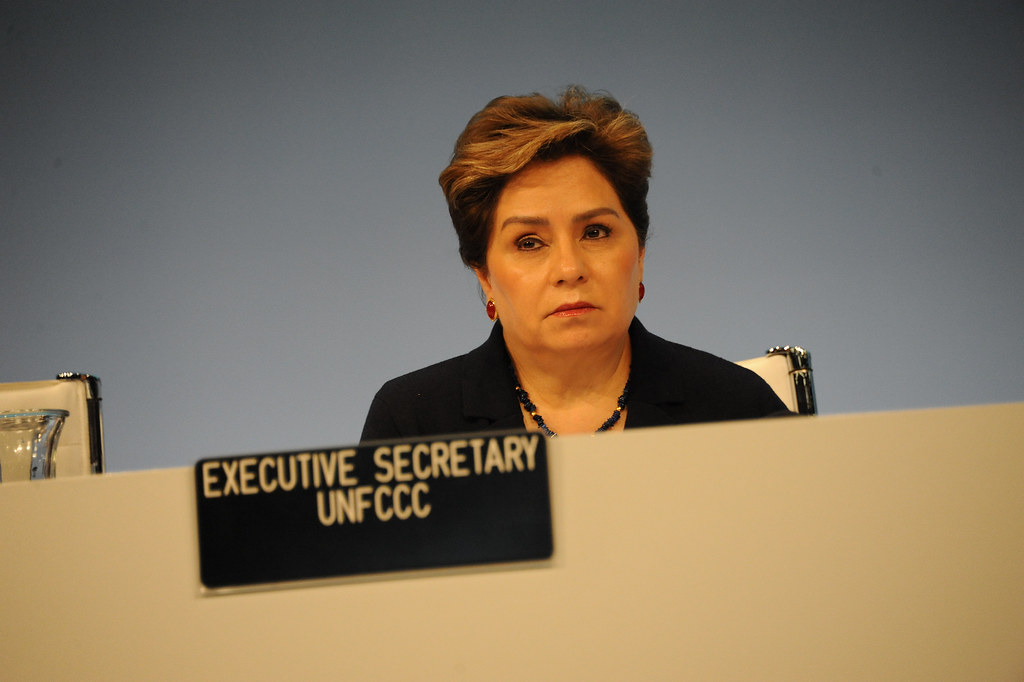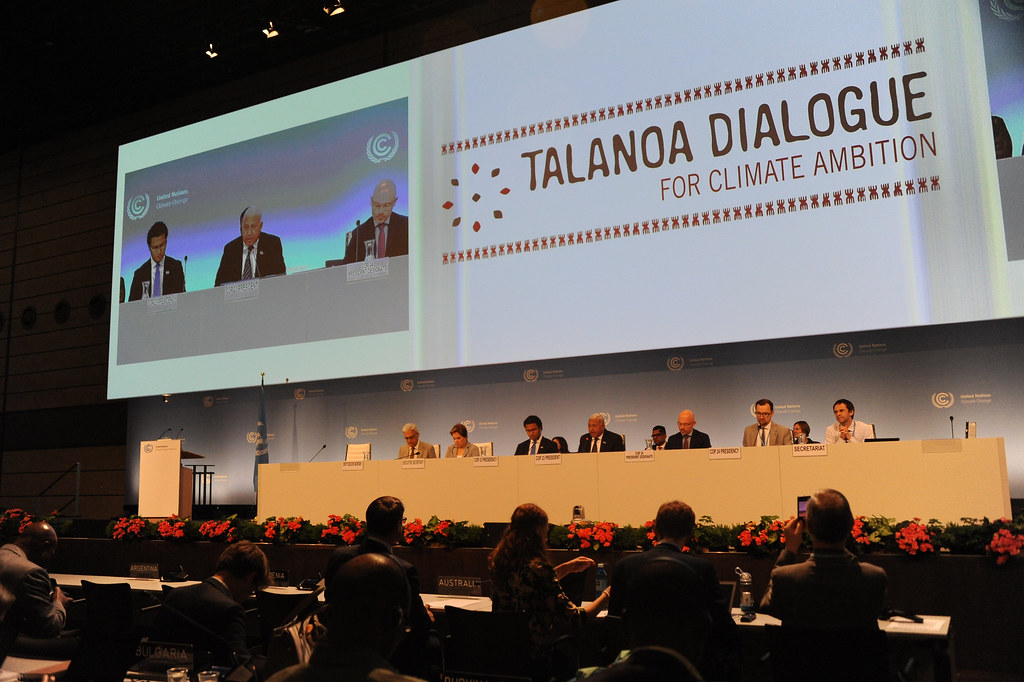聯合國4月30日至5月10日在波昂舉行氣候談判,為2015年通過的巴黎協定制訂出操作手冊。
今年一整年,各國將關注如何在2020年之前擴大其氣候行動的企圖心和執行力。所有國家都認為氣候行動是2020年巴黎協定實施前的關鍵。
三個優先事項 替COP24做準備
聯合國氣候變遷綱要公約(UNFCCC)執行秘書埃斯皮諾薩(Patricia Espinosa)為此次會議列出三個優先事項:
一、政府、非政府組織、企業、投資者和公民等所有利害關係人必須在2020年前加速氣候行動。
二、國際社會必須完成巴黎協定的指導方針或操作手冊,以發揮協定的能量。
三、必須改善條件,使各國能夠更具企圖心地訂定國內減緩暖化的政策。
在去年11月由斐濟領導的聯合國氣候變化大會(COP23)上,各國同意加速並完成工作,以便在今年12月於波蘭卡托維茲召開的第24次締約方會議(COP24)上正式確定指導方針,也就是巴黎協定的工作計畫。這次波昂會議上,各國政府正在起草文本,以利在COP24會議上完成。
要評估世界是否正走在實現巴黎協定目標的路上——限制溫室氣體排放、同時努力保持升溫1.5°C內——必須仰賴這份操作手冊。
女性、生態、社區 大量複製成功案例
此次會談側重於如何使巴黎協定獲得所需的財政支持。據估計,到2020年,氣候變遷造成每年不可避免的損失高達500億美元,2030年將增至3000億美元。
為了找到適應洪水和乾旱等氣候變遷影響的方法,專家和政府於5月9日和10日在波昂氣候會議上召開適應技術專家會議(Technical Expert Meetings on Adaptation),討論如何擴大和複製社區和生態系統的適應成功案例,好為全球政策、實踐和投資鋪路,轉化為滿足弱勢社群、群體和生態系統需求的政策選擇和行動。
由於女性往往嚴重受氣候變遷影響,但又在糧食生產中扮演重要角色,尤其開發中國家女性,因此其中一個會談主題就是建構女性的適應能力。所有會談都將針對如何加強對地區和行動的尊重、順暢地實踐計畫,並加強國家和地方各層級之間的協調性提出建議。
美國退出現資金缺口 彭博:缺多少我來補
由於美國總統川普宣布退出巴黎協定,今年3月下旬,美國國會宣布今年將提供UNFCCC的資金從750萬美元降至300萬美元,減少450萬。
億萬富翁慈善家、紐約市前市長和聯合國氣候行動特使彭博,去年6月便承諾補足UNFCCC秘書處的資金短缺。因此彭博將捐出450萬美元,預計用於一般業務,包括協助各國達成符合巴黎協定的溫室氣體減排目標。
彭博表示,如果美國政府2019年繼續不付錢,他將繼續幫美國政府補足其在聯合國氣候預算中的份額。
太平洋的傳統 「Talanoa Dialogue」讓對談更順暢
這次波昂會議的一個重要目標是實行斐濟在COP23上提倡的「Talanoa Dialogue」促進性對話機制,其目的是進行包容性、參與性和透明的對話。
源自太平洋地區傳統,Talanoa Dialogue透過分享故事、建立同理心,為集體利益作出明智的決定,避免彼此指責和批評,為思想交流和集體決策創造安全的空間。
各國透過這樣的對話確認進展情況、重申巴黎協定目標,幫助各國提升現在和下一輪國家自主貢獻計劃的企圖心。
延續對談內容 部長間政治談判展開
COP24的政治談判階段將延續這些對話內容。政治談判階段將由政府部長和高級官員進行對話,以期產生政治動力來遏止氣候暖化。
世界衛生組織(WHO)警告,極端氣候事件的記錄正在以前所未有的速度被打破,如果溫室氣體持續增加,改變地球氣候,地球有可能變得讓人類無法生存。
WHO官員在COP23上提出新資料警告,地球每10人中有9人呼吸含有高濃度污染物的空氣,每年大約有700萬人死於空氣污染。如果燃燒化石燃料和砍伐森林導致的碳排放繼續照目前的速度上升,全球氣溫上升和極端天氣造成的死亡人數將高於700萬人。
Bonn talks, which opened April 30 and run through May 10, are focused on developing the operating manual for implementing the landmark 2015 Paris Agreement.
The UNFCCC chief outlined three priorities:
First, all stakeholders, including governments, nongovernmental organizations, businesses, investors and citizens, must accelerate climate action by 2020.
Second, she said, the international community must complete the Paris Agreement guidelines, or operating manual, to unleash the potential of the accord.
Third, conditions must be improved to enable countries to be more ambitious in determining their own national policies to slow down global warming.
At the UN Climate Change Conference (COP23) held last November under the leadership of Fiji, nations agreed to accelerate and complete their work to put in place the guidelines, officially known as the Paris Agreement Work Programme, at COP24 in Katowice, Poland this coming December.
At this Bonn meeting, governments are drafting texts to be finalized at COP24.
Finishing the operating manual is necessary to assess whether the world is on track to achieve the goals of the Paris Agreement – limiting greenhouse gas emissions, while pursuing efforts to keep the temperature rise to less than 1.5°C.
Throughout this year, countries will focus on how they can scale up their climate ambition and implementation in the pre-2020 period. All countries share the view that climate action is essential prior to 2020 when implementation of the Paris Accord begins.
Talks focused on the financial support needed to make the Paris Agreement work. By one estimate, the annual un-avoided damages of climate change will cost $50 billion by 2020, growing to $300 billion in 2030.
To find ways of increasing resilience to climate change impacts such as floods and droughts, experts and governments are convening May 9 and 10 in Bonn to discuss how successful adaptations in communities and ecosystems can be scaled up and replicated.
The meeting is taking place during the UN Climate Change Conference in Bonn as part of the Technical Expert Meetings on Adaptation. It aims to pave the way for global policies, practices and investments to be translated into policy options and actions that meet the needs of vulnerable communities, groups and ecosystems.
Because women tend to be greatly affected by climate change while playing a huge role in food production, especially in developing countries, one session will focus on building the adaptive capacity of women.
All sessions will produce recommendations to boost support for respecting areas and actions, ease the move from planning to implementation and increase coordination between the national and local levels.
Michael Bloomberg, the billionaire philanthropist, former Mayor of New York City, and UN Special Envoy for Climate Action, pledged last June to make up the funding shortfall of the Climate Change Secretariat, the UNFCCC. The shortfall was caused by U.S. President Donald Trump’s announced withdrawal from the Paris Agreement on climate change.
In late March, the United States Congress announced that it was cutting funding to the UNFCCC for this year by $4.5 million; from $7.5 million, down to $3 million.
Bloomberg’s $4.5 million contribution will go towards general operations, including assisting countries to meet targets for cutting greenhouse gas emissions in line with the Paris Accord.
Bloomberg said he will make additional funds available to the UN Climate Change Secretariat should the U.S. government continue to fail to pay its share of the UN climate budget in 2019.
An important objective of the May session in Bonn is holding the Talanoa Dialogue.
The Pacific island concept of Talanoa was introduced by Fiji, which held the Presidency of the COP23 UN Climate Change Conference. It aims at an inclusive, participatory and transparent dialogue.
Traditional in the Pacific region, the purpose of Talanoa is to share stories, build empathy and to make wise decisions for the collective good. The Talanoa method purposely avoids blame and criticism to create a safe space for the exchange of ideas and collective decision-making.
The consultative dialogue will check progress, reaffirm the goals of the Paris Agreement and aim to help countries increase their ambition now and in the next round of their voluntary national climate action plans, known as Nationally Determined Contributions.
The content of these story-telling conversations will feed into the Talanoa Dialogue’s political phase at COP24. The political phase will bring together government ministers and high-level officials for conversations with a view to generating political momentum to check the warming climate.
The World Health Organization <www.who.int>(WHO) has warned that records for extreme weather events are being broken at an unprecedented rate, and that there is a real risk that the planet could lose its capacity to sustain human life if the climate is further altered by adding ever more heat-trapping greenhouse gases.
WHO officials expressed the warning while presenting new data at the UN Climate Change Conference in Bonn that shows that nine out of 10 people breathe air containing high levels of pollutants and that around seven million people every year die from exposure to fine particles in polluted air.
The figure could be surpassed by deaths caused by rising global temperatures and extreme weather if emissions, primarily caused by the burning of fossil fuels and deforestation, are allowed to rise at their present rate.
※ 全文及圖片詳見:ENS








